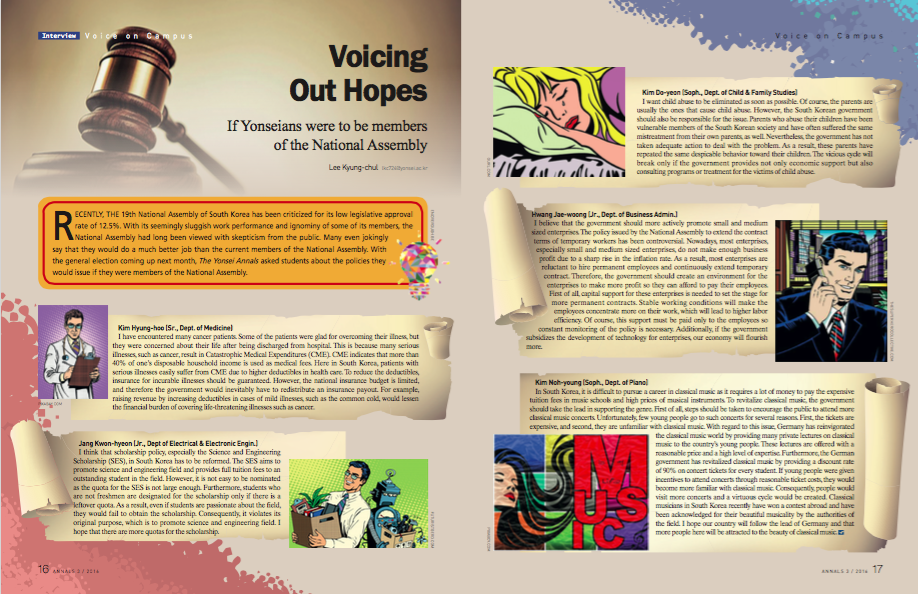If Yonseians were to be members of the National Assembly

RECENTLY, THE 19th National Assembly of South Korea has been criticized for its low legislative approval rate of 12.5%. With its seemingly sluggish work performance and ignominy of some of its members, the National Assembly had long been viewed with public skepticism from the public. Many even jokingly say that they would do a much better job than the current members of the National Assembly. With the general election coming up next month, The Yonsei Annalsasked students about the policies they would issue if they were members of the National Assembly.
Kim Do-yeon (Soph., Dept. of Child & Family Studies)
I want child abuse to be eliminated as soon as possible. Of course, the parents are usually the ones that cause child abuse. However, the South Korean government should also be responsible for the issue. Parents who abuse their children have been vulnerable members of the South Korean society and have often suffered the same mistreatment from their own parents, as well. Nevertheless, the government has not taken adequate action to deal with the problem. As a result, these parents have repeated the same despicable behavior toward their children. The vicious cycle will break only if the government provides not only economic support but also consulting programs or treatment for the victims of child abuse.
Hwang Jae-woong (Jr., Dept. of Business Admin.)
I believe that the government should more actively promote small and medium sized enterprises. The policy issued by the National Assembly to extend the contract terms of temporary workers has been controversial. Nowadays, most enterprises, especially small and medium sized enterprises, do not make enough business profit due to a sharp rise in the inflation rate. As a result, most enterprises are reluctant to hire permanent employees and continuously extend temporary contract. Therefore, the government should create an environment for the enterprises to make more profit so they can afford to pay their employees. First of all, capital support for these enterprises is needed to set the stage for more permanent contracts. Stable working conditions will make the employees concentrate more on their work, which will lead to higher labor efficiency. Of course, this support must be paid only to the employees so constant monitoring of the policy is necessary. Additionally, if the government subsidizes the development of technology for enterprises, our economy will flourish more.
Kim Hyung-hoo (Sr., Dept. of Medicine)
I have encountered many cancer patients. Some of the patients were glad for overcoming their illness, but they were concerned about their life after being discharged from hospital. This is because many serious illnesses, such as cancer, result in the Catastrophic Medical Expenditures (CME). The CME indicates that more than 40% of one’s disposable household income is used as medical fees. Here in South Korea, patients with serious illnesses easily suffer from the CME due to higher deductibles in health care. To reduce the deductibles, insurance for incurable illnesses should be guaranteed. However, the national insurance budget is limited, and therefore the government would inevitably have to redistribute an insurance payout. For example, raising revenue by increasing deductibles in cases of mild illnesses, such as the common cold, would lessen the financial burden of covering life-threatening illnesses such as cancer.
Kim Noh-young (Soph., Dept. of Piano)
In South Korea, it is difficult to pursue a career in classical music as it requires a lot of money to pay the expensive tuition fees in music schools as well as the and high prices of musical instruments. To revitalize classical music, the government should take the lead in supporting the genre. First of all, steps should be taken to encourage the public to attend more classical music concerts. Unfortunately, few young people go to such concerts for several reasons. First, the tickets are expensive, and second, they are unfamiliar with classical music. With regard to this issue, Germany has reinvigorated the classical music world by providing many private lectures on classical music to the country’s young people. These lectures are offered with a reasonable price and a high level of expertise. Furthermore, the German government has revitalized classical music by providing a discount rate of 90% on concert tickets for every students. If young people were given incentives to attend concerts through reasonable ticket costs, they would become more familiar with classical music. Consequently, people would visit more concerts and a virtuous circle would be created. Classical musicians in South Korea recently have won a contest abroad and have been conceded for their beautiful musicality by the authorities of the field. I hope our country will follow the lead of Germany and that more people here will be attracted to the beauty of classical music.
Jang Kwon-hyeon (Jr., Dept of Electrical & Electronic Engin.)
I think that scholarship policy, especially the Science and Engineering Scholarship (SES), in South Korea has to be reformed. The SES aims to promote science and engineering field and provides full tuition fees to an outstanding student in the field. However, it is not easy to be nominated as the quota for the SES is not large enough. Furthermore, students who are not freshmen are designated for the scholarship only if there is a leftover quota. As a result, even if students are passionate about the field, they would fail to obtain the scholarship. Consequently, it violates its original purpose, which is to promote science and engineering field. I hope that there are more quotas for the scholarship.
Lee Kyung-chul
lkc724@yonsei.ac.kr

